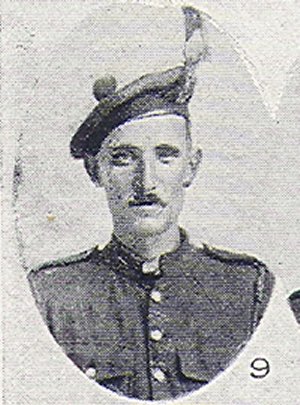Pte
William Robert Dellapinna
Information about birth
|
Date of birth: 28/05/1888 |
|
Place of birth: Surrey, Lambeth, England, United Kingdom |
General information
|
Last known residence: 201 Pleasant Street, Halifax, Nova Scotia, Canada |
|
Profession: Teamster |
|
Religion: Church of England |
Army information
|
Country: Canada |
|
Force: Canadian Expeditionary Force |
|
Rank: Private |
|
Service number: 282257 |
|
Enlistment date: 13/03/1916 |
|
Enlistment place: Halifax, Nova Scotia, Canada |
Information about death
|
Date of death: 30/10/1917 |
|
Place of death: Tiber, Passchendaele, Belgium |
|
Cause of death: Killed in action (K.I.A.) |
|
Age: 29 |
Cemetery
|
Tyne Cot Cemetery Plot: XVIII Row: G Grave: 2 |
Distinctions and medals 2
|
British War Medal Medal |
|
Victory Medal Medal |
Points of interest 4
| #1 | Place of birth | ||
| #2 | Last known residence | ||
| #3 | Enlistment place | ||
| #4 | Place of death (approximate) |
My story
William Robert Dellapinna was born in May 1888 in Lambeth, near London, England. Twenty years later, he married Sarah Jane Wagstaff in Halifax, Nova Scotia. In March 1916, the driver enlisted in the Canadian Expeditionary Force in Calgary, Alberta. He was eventually assigned to the 85th Battalion, better known as the Nova Scotia Highlanders, part of the 12th Canadian Brigade of the 4th Canadian Division.
On October 28, 1917, the 4th Canadian Division left camp near Ypres and moved to the front, relieving the 44th Battalion at Keerselaarhoek, between Decline Copse near the railway and Passchendaele Street. On October 29, the men spent the day in shell craters and narrow trenches, preparing for the next day’s assault.
On October 30, 1917, the Canadians resumed their assault on Passchendaele. The 85th Battalion followed the Ypres–Roulers railway toward Vienna Cottages — once a cluster of homes nestled against the tracks. The hamlet had been reduced to a series of shell holes. The Highlanders suffered heavily: the guns meant to support the attack sank into the mud and could barely provide cover. As soon as the Highlanders freed themselves from the muck, they came under heavy fire. But the storm surged forward unstoppably. In exchange for the foul shell craters at Vienna Cottages, half the Highlanders were killed, wounded, or missing. Before returning to Canada, the 85th Battalion placed a memorial marker near their jump-off position.
The 29-year-old was killed on October 30, 1917. He was buried near Passchendaele Street, in front of the positions known as Tiber and Vienna Cottages. After the war, he was reburied at Tyne Cot Cemetery, Plot XVIII, Row G, Grave 2.
On October 28, 1917, the 4th Canadian Division left camp near Ypres and moved to the front, relieving the 44th Battalion at Keerselaarhoek, between Decline Copse near the railway and Passchendaele Street. On October 29, the men spent the day in shell craters and narrow trenches, preparing for the next day’s assault.
On October 30, 1917, the Canadians resumed their assault on Passchendaele. The 85th Battalion followed the Ypres–Roulers railway toward Vienna Cottages — once a cluster of homes nestled against the tracks. The hamlet had been reduced to a series of shell holes. The Highlanders suffered heavily: the guns meant to support the attack sank into the mud and could barely provide cover. As soon as the Highlanders freed themselves from the muck, they came under heavy fire. But the storm surged forward unstoppably. In exchange for the foul shell craters at Vienna Cottages, half the Highlanders were killed, wounded, or missing. Before returning to Canada, the 85th Battalion placed a memorial marker near their jump-off position.
The 29-year-old was killed on October 30, 1917. He was buried near Passchendaele Street, in front of the positions known as Tiber and Vienna Cottages. After the war, he was reburied at Tyne Cot Cemetery, Plot XVIII, Row G, Grave 2.
Sources 5
|
Hayes J., The Eighty-Fifth in France and Flanders, (Halifax, Royal Print & Litho Limited, 1922), 90-96. Sources used |
|
McCarthy Chris., Passchendaele. The Day-by-Day Account (London, Unicorn Publishing Group, 2018) 153. Sources used |
|
Personnel Records of the First World War (Library and Archives Canada, Ottawa (LAC), RG 150, Accession 1992-93/166, Box 2422 - 38). https://library-archives.canada.ca/ Sources used |
|
War diaries: 85st Canadian Infantry Battalion (Library and Archives Canada, Ottawa (LAC), RG9-III-D-3, Volume number: 4944, Microfilm reel number: T-10751--T-10752, File number: 454). https://library-archives.canada.ca/ Sources used |
|
War Graves Registers: Circumstances of Death (Library and Archives Canada, Ottawa (LAC), RG 150, 1992-93/314; Volume Number: 171). https://library-archives.canada.ca/ Sources used |
More information 4
|
Commonwealth War Graves Commission Database https://www.cwgc.org/find-records/find-war-dead/casualty-details/462534 |
|
Namenlijst (In Flanders Fields Museum) https://namenlijst.org/publicsearch/#/person/_id=b44ec1ec-2d07-4ecb-9efc-76a13cefacad |
|
The Canadian Virtual War Memorial https://www.veterans.gc.ca/eng/remembrance/memorials/canadian-virtual-war-memorial/detail/462534 |
|
Lives of the First World War (Imperial War Museum) https://livesofthefirstworldwar.iwm.org.uk/lifestory/5824787 |
